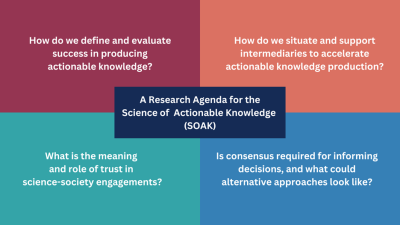A Research Agenda for the Science Of Actionable Knowledge (SOAK)
There is growing interest in the scientific community to develop actionable sciences that inform actions related to critical environmental challenges. Yet, the actual connections between scientific knowledge, decision-making, and resulting outcomes are not straightforward. SOAK is an emerging scientific field that examines “how” science becomes actionable, that is, how science becomes used to inform decisions that enhance social and environmental well-being. SOAK builds on many prior fields, such as science-policy interface (SPI), transdisciplinarity, translational science, co-production, etc. This research systematically reviews SPI literature to identify ‘claims’ or key assertions about science-society interactions and develop a future research agenda for SOAK.
This work combines an extensive literature review of over 100 publications, and an expert elicitation exercise with internationally-renowned SOAK experts, to identify the differences, tensions, and ambiguities that exist when considering how science can inform societal actions. Through this process, this work develops an accumulated understanding of several decades of SPI scholarship offering substantive knowledge claims that can help guide future research in SOAK. The resultant research agenda questions can direct actionable science researchers towards specific gap areas or avenues that the expert analysis suggests as deserving greater attention in future SOAK scholarship.
Linking science with action affords a prime opportunity to leverage greater societal impact from research and increase the use of evidence in decision-making. Success in these areas depends upon processes of producing and mobilizing knowledge, as well as supporting and making decisions. For decades, scholars have described these processes in different ways, resulting in numerous assumptions that now guide engagements at the interface of science and society. We systematically catalog these assumptions based on prior research on the science-policy interface and distill them into 26 claims. We then elicit expert perspectives (n=16) about these claims to assess the extent to which they are accurate or merit further examination.
Out of this process, we construct a research agenda to motivate future scientific research on actionable knowledge, prioritizing areas that experts identified as critical gaps. Four key research topics emerged as warranting further research: (1) Evaluating the success of actionable knowledge, (2) Supporting intermediaries in facilitating science-society engagements, (3) Examining whether and how trust about knowledge is built, and (4) Exploring the role of consensus in science-society engagements. We offer these suggestions with the hope of furthering the science of actionable knowledge as a transdisciplinary area of inquiry.

